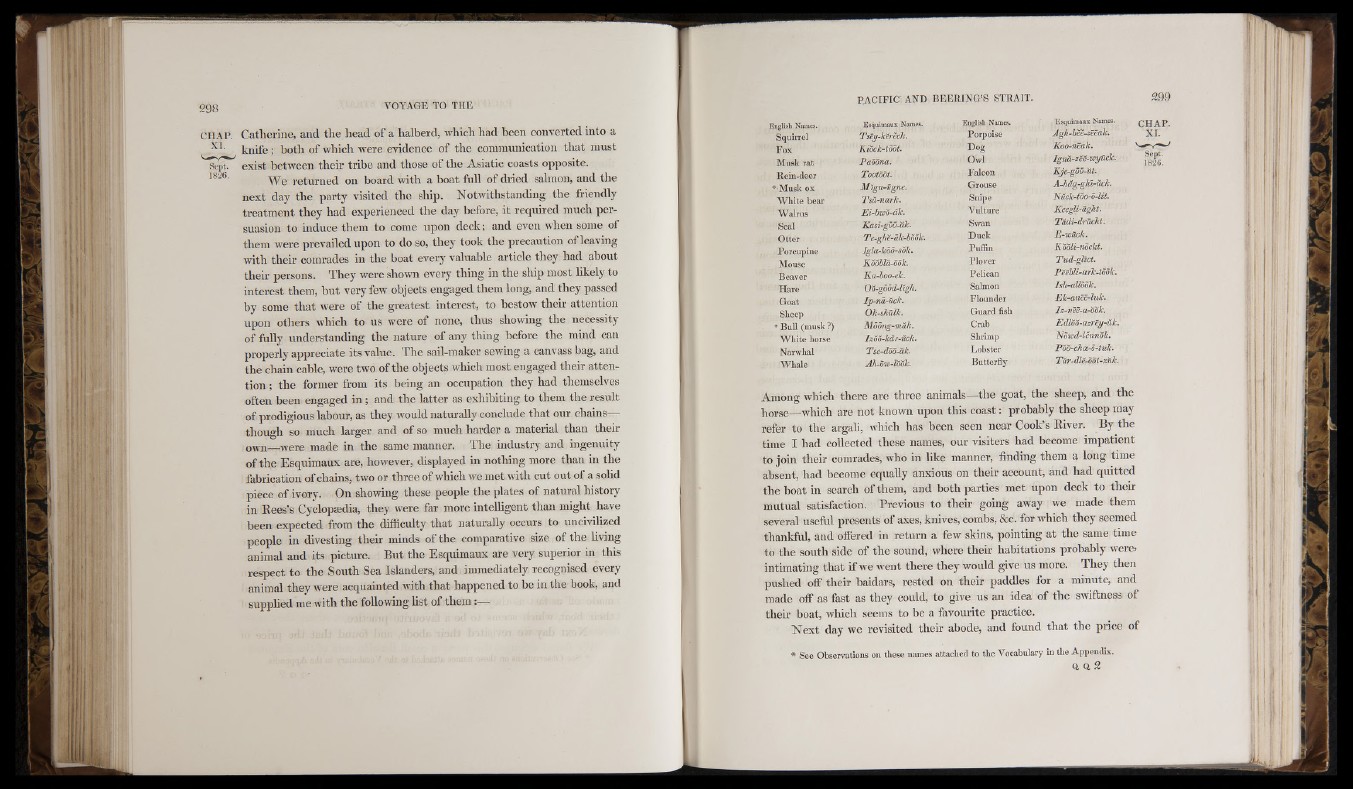
Sept.
1826.
!!'
I ii
C H A P . Catherine, and the head of a halberd, which had been converted into a
knife; both of which were evidence of the communication that must
exist between their tribe and those of the Asiatic coasts opposite.
We returned on board with a boat full of dried salmon, and the
next day the party visited the ship. Notwithstanding the friendly
treatment they had experienced the day before, it required much persuasion
to induce them to come upon deck; and even when some of
them were prevailed upon to do so, they took the precaution of leaving
with their comrades in the boat every valuable article they had about
their persons. They were shown every thing in the ship most likely to
interest them, but very few objects engaged them long, and they passed
by some that were of the greatest interest, to bestow their attention
upon others which to us were of none, thus showing the necessity
of fully understanding the nature of any thing before the mind can
properly appreciate its value. The sail-maker sewing a canvass bag, and
the chain cable, were two of the objects which most engaged their attention
; the former from its being an occupation they had themselves
often been engaged in ; and the latter as exhibiting to them the result
of prodigious labour, as they would naturally conclude that our chains—
though so much larger and of so much harder a material than their
own—were made in the same manner. The industry and ingenuity
of the Esquimaux are, however, displayed in nothing more than in the
fabrication of chains, two or three of which we met with cut out of a solid
piece of ivory. On showing these people the plates of natural history
in Kees’s Cyclopmdia, they were far more intelligent than might have
been expected from the difficulty that naturally occurs to uncivilized
people in divesting their minds of the comparative size of the hving
animal and its picture. But the Esquimaux are very superior in this
respect to the South Sea Islanders, and immediately recognised every
animal they were acquainted with that happened to be in the book, and
supplied me with the following list of them :—
P A C IF IC A N D B E E R IN G ’S S T RA IT .
English Names. Esquimaux Names. English Names. E squimaux Names.
S quirrel Tscy-kiirecJc. Porpoise Agh-bee-zecak.
Fox Kiock-lodt. D o g Koo-neak.
Musk ra t Paoona. Owl Ignd-zde-wydck.
Rein-deer Tootddt. Falcon Kje~gdd-dt.
* M u sk ox Mig n -v g n e. Grouse A-hdg-gh'i-uck.
W h ite b ea r T su -n a rk. Snipe mc k-tb o -d -lit.
W a lru s Ei-bwo-dlc. V u ltu re Keegli-dght.
Seal Kasi-gdo-dk. Swan Tddi-drdcht.
O tte r Te-ghij-ak-bdbk. Du c k E -w d ck .
Porcupine Igla-kuo-sbk. Puffin Kooli-nocki.
Mouse Kbbhld-ddk. P lo v e r T ud-glic t.
Beaver Ka-boo-ek. Pelican Pecbli-ark-took.
H a re Oo-gdod-ligh. Salmon Ish-allodk.
Goat Ip-na-uck. F lounde r Ek-ance -luk.
Sheep Ok-shulk. G u a rd fish lz~nee-a-odk.
* B u ll (musk ?) Moong-mdk. Crab Edldd-azrey-iik.
W h ite horse Jzod-kdr-iick. Shrimp Nozvd-lenndk.
Na rwhal Tse-dod-dk. Lobster Pov-c/ice-o-tuk.
W h a le Ah~ow-ldok. Butte rfly Tdr-dle-ool-zdk.
Among which there are three animals—the goat, the sheep, and the
horse—which are not known upon this coast; probably the sheep may
refer to the argali, which has been seen near Cook’s Eiver. By the
time I had collected these names, our visiters had become impatient
to join their comrades, who in like manner, finding them a long time
absent, had become equally anxious on their account, and had quitted
the boat in search of them, and both parties met upon deck to their
mutual satisfaction. Previous to their going away we made them
several useful presents of axes, knives, combs, &c. for which they seemed
thankful, and offered in return a few skins, pointing at the same time
to the south side of the sound, where their habitations probably were,
intimating that if we went there they would give us more. They then
pushed off their baidars, rested on their paddles for a minute, and
made off as fast as they could, to give us an idea of the swiftness of
their boat, which seems to be a favourite practice.
Nex t day we revisited their abode, and found that the price of
• See Observations on these names attachetl to th e Vocabulary in the A p pendix.
Q Q 2